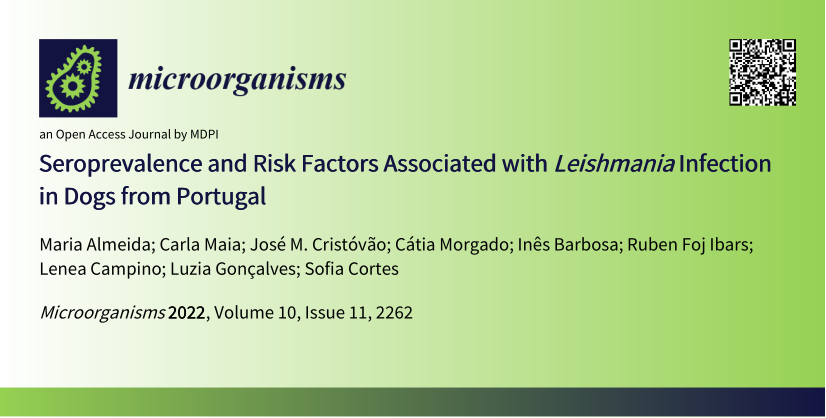The original article entitled “Seroprevalence and Risk Factors Associated with Leishmania Infection in Dogs from Portugal” has just been published on Microorganisms, one of the MDPI open access and peer-reviewed journals.
Maria Almeida, Carla Maia, José M. Cristóvão, Lenea Campino, Luzia Gonçalves and Sofia Cortes were the GHTM/IHMT-NOVA’s scientists involved in this study, which aimed to update seroprevalence for Leishmania infection and reassess risk factors in Portugal.
Canine leishmaniosis (CanL) caused by Leishmania infantum is an important zoonosis in southwestern European countries where this disease is endemic, and dogs, as domestic animals in close contact with humans, are the reservoir hosts for the parasite. In Portugal, CanL is of relevant veterinary concern. The previous national study revealed an overall seroprevalence of 6.3%. Since then, new prophylactic measures, such as vaccines, have been introduced in Europe.
Here, a cross-sectional study was conducted from January–March 2021 with 1860 client-owned dogs from continental Portugal. A questionnaire and whole blood samples on filter paper were collected and a direct agglutination test was used to calculate anti-Leishmania antibody titres.
The results showed that “true seroprevalence was 12.5% (95% CI 10.3–13.2%). The potential risk factors associated with L. infantum infection in dogs were: age ≥ 2 years (aOR = 1.68, 95% CI 1.1–2.6), residing in the interior regions of the country (aOR = 1.92, 95% CI 1.3–2.9), and non-use of repellents (aOR = 1.75, 95% CI 1.2–2.5)”.
In conclusion, the authors mentioned that “the key to controlling CanL and its impact on Public Health in endemic areas lies in continuous implementation of prophylactic measures, through the correct use of repellents/insecticides and vaccines and early detection and monitoring of infected dogs”.
Learn more about the study here.
